Your Ultimate HVAC Replacement Guide
Enjoy reading the latest DIY articles and saving money?
Receive our latest helpful hints, tricks and savings, directly to your inbox.
Posted July 11, 2025
Did you know that central air conditioners could be a costly purchase? Scheduling an air conditioning service will help clean out filters, drains, and lines, but it might not solve your problem related to rising monthly energy costs.
Most central air conditioners are expected to last between 10 and 15 years. At that point, you have a few options. You can replace your air conditioner or see about an HVAC replacement. Your heating, cooling, and ventilation units work together to keep your indoor temperatures and climate comfortable year-round. Choosing to replace an HVAC system could save you hefty repair costs. Are you still interested?
Luckily, we have put together a comprehensive guide that covers everything you need to know about an HVAC replacement and how you can save money in the long term. Keep reading on for more information!
HVAC Repair vs. HVAC Replacement
Sometimes, you may need a simple air conditioning service to get your HVAC up and running smoothly. You should perform regular AC service inspections as part of your HVAC maintenance plan to improve the longevity of your system.
Typically, spring is an excellent time to have your AC unit thoroughly inspected before kicking it into full gear. Simple HVAC maintenance checks can catch problems early and save you hundreds of dollars in costly repairs down the road. Here are some simple AC parts that should be checked at least annually:
- Drainage hole
- Air ducts
- Thermostat
- House leaks
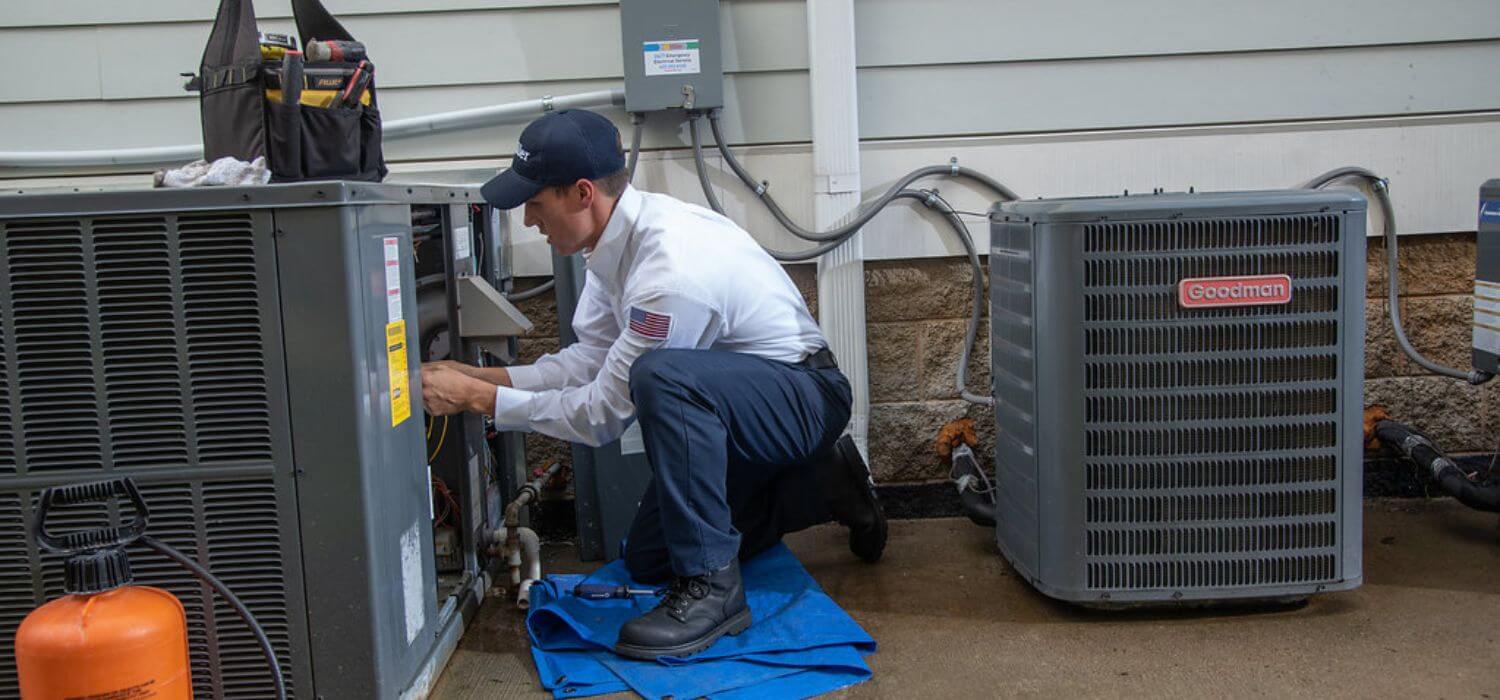
Fixing a small leak will prevent future damage to your house and the entire HVAC unit. However, there are situations where you will want to opt for an entire HVAC replacement. For starters, HVAC efficiency decreases with wear and tear, and they aren’t meant to last forever.
HVAC systems typically last between 15 and 20 years. It might not last that long if you have dirty coils, clogged filters, or an improper HVAC size. Clogs and leaks reduce your system’s efficiency by upwards of 25 percent!
Over time, your system will work hard to heat or cool your house, adding strain to the motor, fan, and entire unit. If your HVAC unit is nearing 15 to 20 years, your technician may suggest replacing it entirely versus spending money on more minor repairs.
Other Signs You Need an HVAC Replacement
Other than age, how can you tell when you need an HVAC replacement? Here are some general HVAC replacement guidelines:
- Longer AC running times
- Noises
- Bad smells
- Frequent repairs
Noises and bad smells may indicate parts need to be replaced. Combined with an aging system, you are better off replacing the unit. If you have a system using an R-22, it is another sign you need it replaced since they are being phased out of the industry.
What Kind of HVAC System Do You Need?
If your technician has come out and you have both decided you need a replacement, there are a few things you will need to look at. First, there are several types of HVAC systems, such as:
- Split system
- Hybrid system
- Ductless system
- Packaged system
There are multiple components and parts within your HVAC system, like central air conditioner, condenser, furnace, heat pump, and more. Even your thermostat plays a critical role in your HVAC unit.

Split systems are the most common HVAC units. It has two separate parts, one for cooling and another for heating. Hybrid systems are recent advances in HVAC technology with electric heating units that provide better energy efficiency.
Ductless systems use an outdoor air conditioner and heat pump. If you don’t already have a duct system installed, this type could save you money.
Packaged systems are not as prevalent. They are single units, usually installed outside.
HVAC Size
Larger isn’t necessarily better in this scenario. If you choose an HVAC unit that is too large for your home, you risk replacing it within a shorter period. Why?
Your unit will turn on and off more frequently, placing added strain on the system. Instead, talk to your HVAC technician about replacing your HVAC unit with the proper size based on square footage and how many rooms you have.
HVAC Upgrades
Newer HVAC systems have excellent upgrade packages, providing more incentive to swap out your old unit. Here are some examples of ways you can improve HVAC efficiency:
- Single or multi-stage heating and cooling
- Zoned systems
- Humidity control
Multi-stage systems will provide you with more cost savings in the long run. You can also choose variable fan speed for better customization and cooling or heating needs. Zoned systems are also great choices if you have larger homes or multiple rooms.
It only heats or cools frequently used areas, saving you money on unnecessary energy costs. Humidity control is a mandatory part of an HVAC unit. It keeps your indoor temperatures comfortable by removing excess humidity and keeping levels around 50 percent.
And if you think that swapping out for a new HVAC unit isn’t worth it, experts found that replacing your 10-year-old air conditioner could save you 20 to 40 percent in energy costs!
Improved Thermostat Control
When you make the switch to a new HVAC, don’t neglect your thermostat. Smart thermostats adjust your temperature when you’re not home. They can also save you money by determining optimal energy efficiency temperatures.
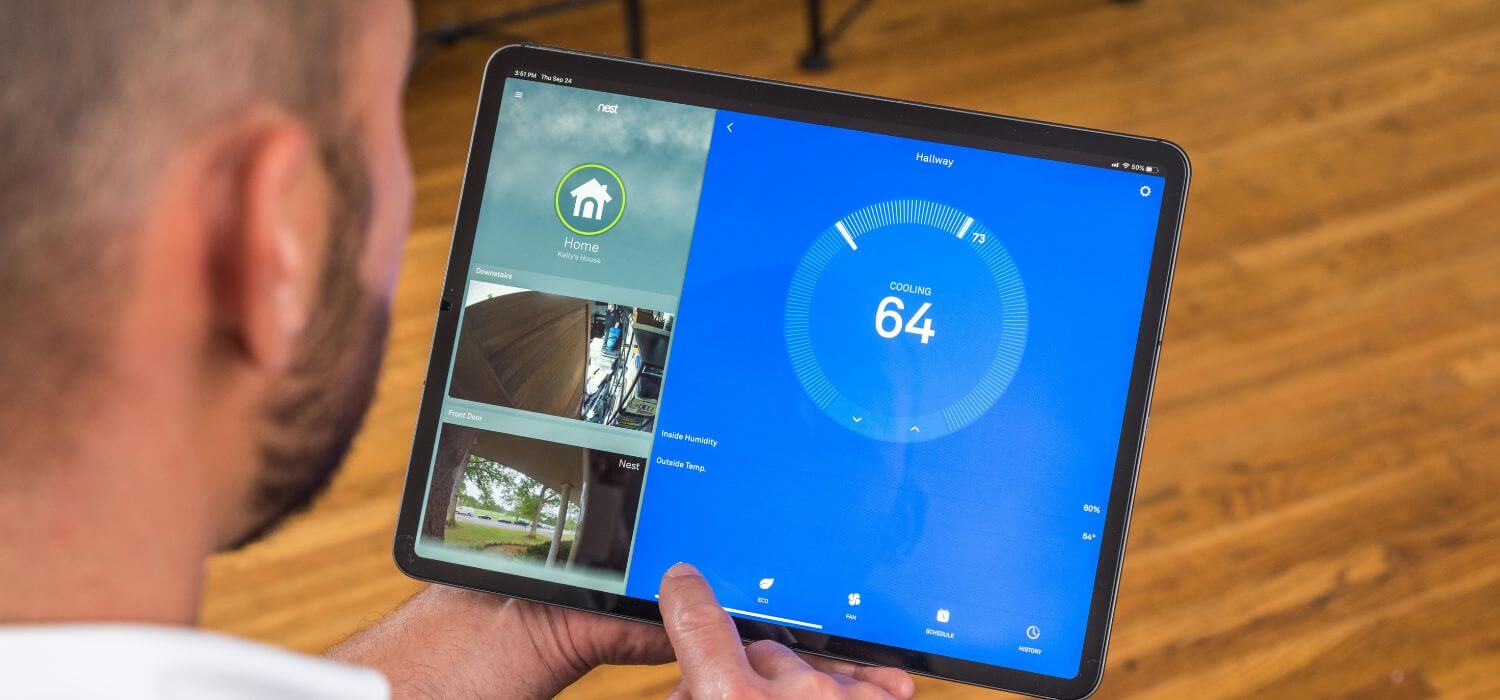
Simply turning your thermostat up 7° to 10° F in the summertime could save you nearly 10% annually. While manual thermostats allow you to set these temperatures, programmable and smart thermostats will detect when you’re home, away, sleeping, and more. Additionally, you should always check that your thermostat works properly before major seasonal transitions, such as fall and spring.
Are SEER Ratings Important?
Yes! SEER ratings play a crucial role in how your HVAC system performs and how much money you will save. The higher the SEER rating, the more energy-efficient. SEER stands for Seasonal Energy Efficiency Ratio. It is the overall energy consumption your AC unit needs to cool your house properly. SEER ratings use a scale that ranges from 0 to 20.
This is a bit deceiving as most units fall between 13 and 16. In 2019, the U.S. Energy Information Administration listed new guidelines that would affect American households in upcoming years.
As of 2023, SEER ratings must be a minimum of 14 in northern states and 15 in southern states. If you have a unit with a SEER rating under 14, it might be time to make the switch and save money! While higher SEER rated units might cost more upfront, they can pay dividends long term.
Is a Whole House Dehumidifier Worth It?
A whole-house dehumidifier can be added to any forced air heating system. The benefit of using a whole-house dehumidifier versus a portable one is longevity. Portable dehumidifiers last between three and five years. On the contrary, a whole-house dehumidifier lasts upwards of ten years and works more efficiently.
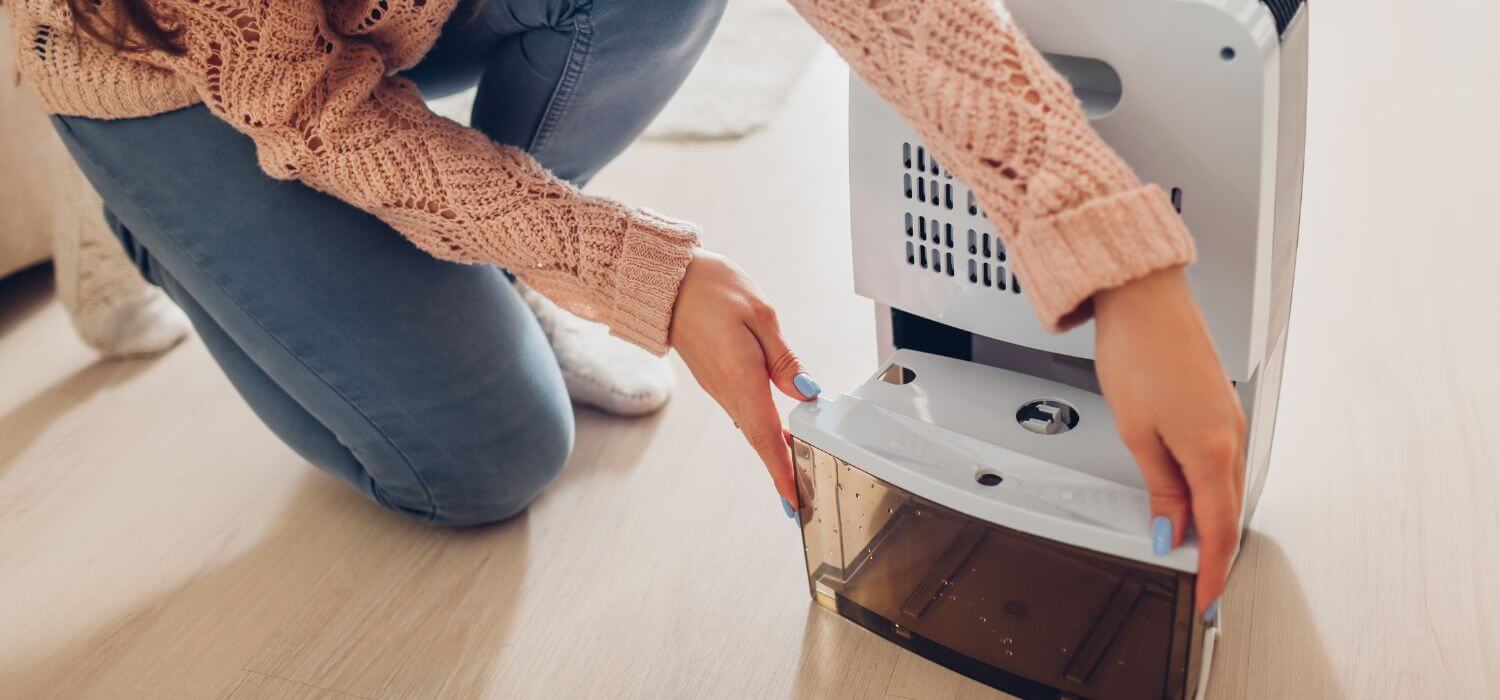
Dehumidifiers do more than make indoor temperatures comfortable. They also prevent musty odors, mildew, and mold. Higher levels of humidity also damage furniture and flooring. It also puts less strain on your HVAC since dehumidifiers work hand in hand with your unit to remove allergens and pollutants. Ultimately, it is a key part of helping boost energy efficiency and cost savings.
Cost of HVAC Units
How much will your new HVAC unit cost? There are several factors that determine the final price tag, including:
- System type
- Size
- Where you live
- Labor and installation fees
- Smart upgrades
On the lower end, you will likely pay between $5,000 and $8,000. If you want a high-end model or additional energy-efficiency features, you may be looking at spending $7,500 to $15,750. While these numbers might make you cringe, your HVAC system is used constantly and plays a significant factor in your monthly energy bills.
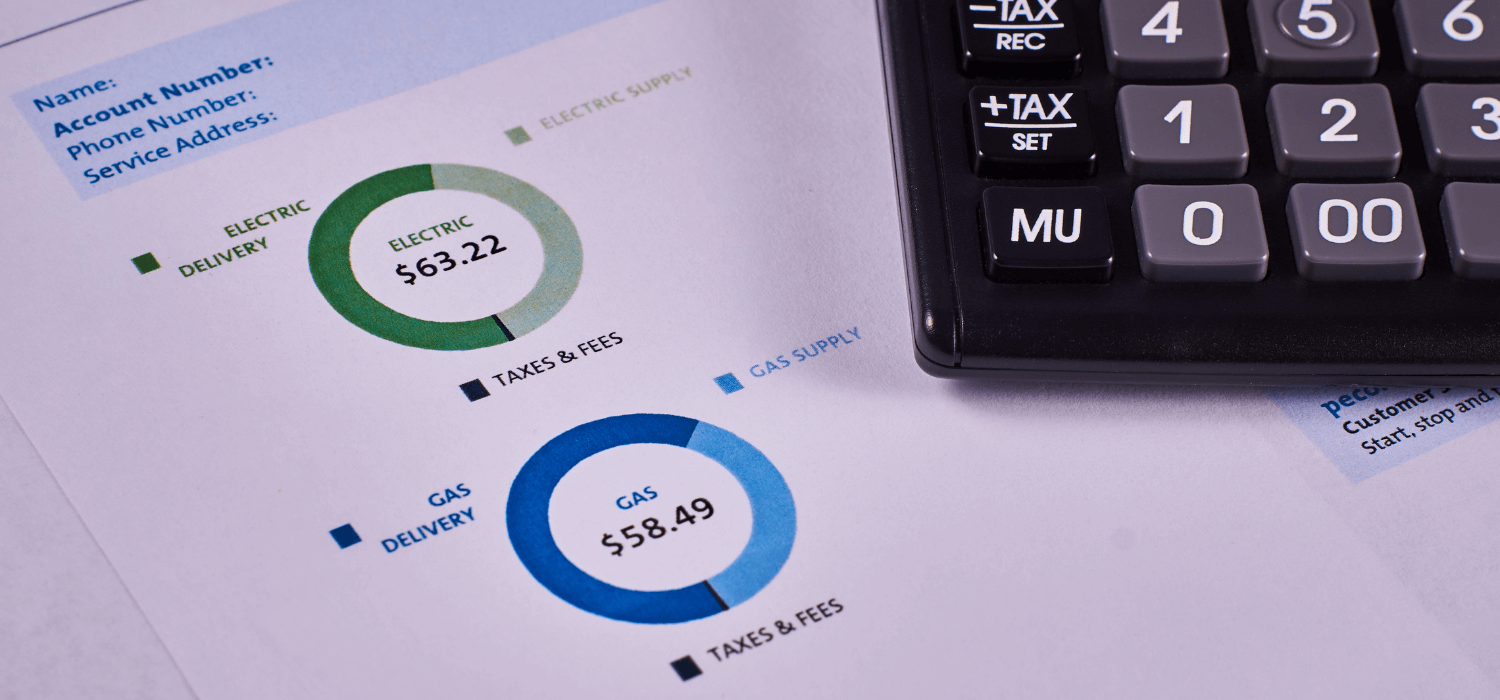
If you want to sell your house in the near future, an old HVAC unit could be a sticking point. Other features that will tack on costs are:
- Noise dampening strips
- Noise-reducing blades
- Insulation
- Compressor insulation
Most of these add-ons reduce the noise of your HVAC, but you don’t need them for a properly functioning air conditioner or furnace. Lastly, this isn’t a DIY project.
Improper installation can increase the risk of hazards, breakdowns, and high costs. Experts found that improperly installed HVACs reduce efficiency by nearly 30 percent!
Inflation and Supply Chain Demands
It is important to note that inflation, labor shortages, and supply chain demands will impact how long it takes to install your unit and the price. For example, appliance prices increased by 8.5% during the past year. Home improvement projects increased by 28% between 2020 and 2021.
Depending on your unit, you may run into similar problems. Ask your HVAC replacement company about financing, affordability, and cost-friendly HVAC options that fit your budget.
How To Find HVAC Service Companies
If you are wondering how to find an “HVAC technician near me,” here are a few helpful tips to get started:
- Read online reviews
- Ask family and friends for suggestions
- Check credentials and licensure
- Ask about services
- Check into emergency repairs
You want an AC repair and heating repair company that is reliable, licensed, and close. Additionally, finding an “AC repair near me” is essential when you have an emergent situation on your hands. Lastly, your HVAC company should have transparent pricing and no hidden costs.
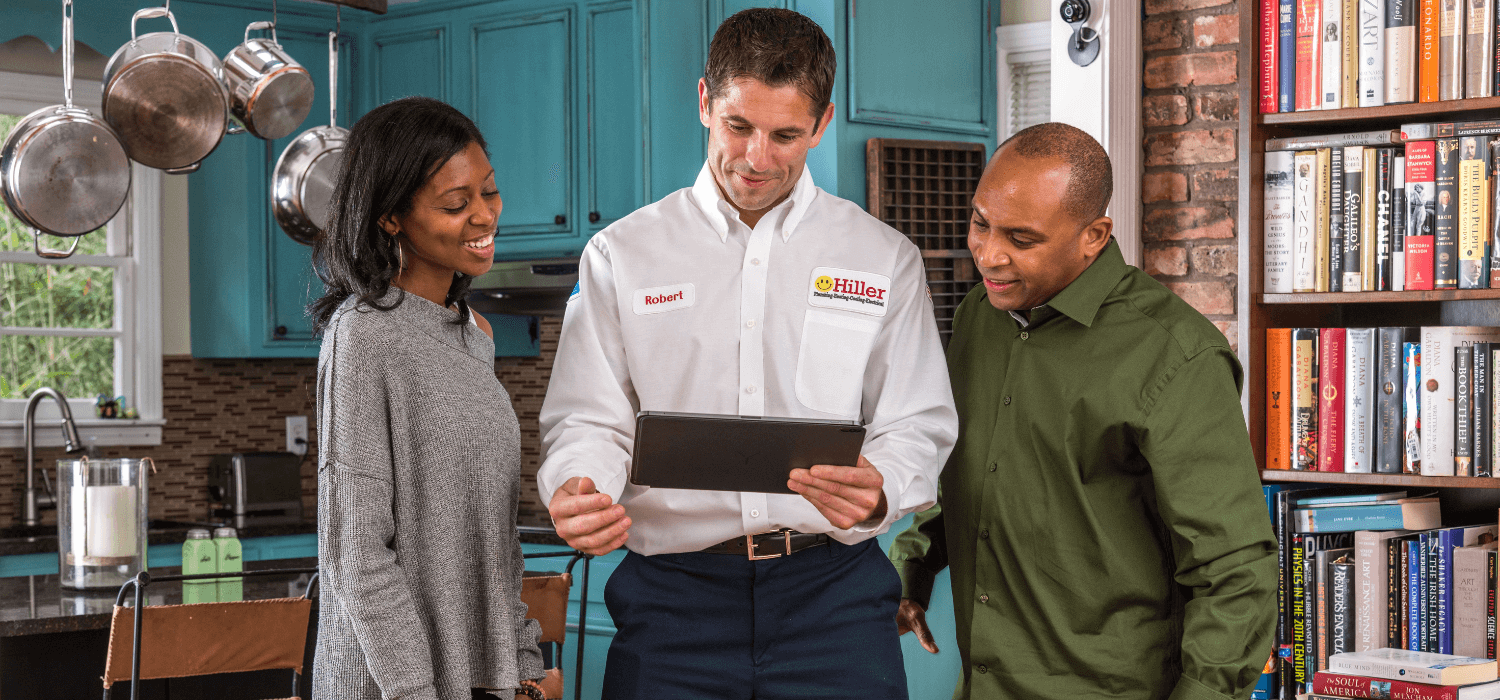
This does not mean that they will always have the lowest repair or replacement costs in the region. Unlicensed companies or those with a reputation for poor workmanship may get away with lower costs to entice naive homeowners.
Don’t fall for that trap. Your HVAC company will have competitive pricing, and you can always ask for comparisons against industry standards.
Professional HVAC Services
What can you expect from a company specializing in HVAC replacement and maintenance services?
- Air conditioner repairs and replacements
- Ductless mini-split installations
- Furnace repair and replacement
- HVAC system replacement
- Improved indoor air quality
- Dehumidifier installation
- Wi-Fi and learning thermostat installation
You will have the option for basic maintenance plans, emergent repairs, and installations. A quality company will advise on cost-friendly home upgrades to save you money long-term. They will also be transparent about diagnostic testing and what to expect with a new HVAC system.
Are Warranties Available?
Often, the manufacturer will have warranties on a new HVAC unit. Additionally, a qualified company will usually offer warranties on workmanship and installation. Extended warranties will vary based on the company you choose and your unit.
You should also look into maintenance plans. If you schedule maintenance plans ahead, you could save money and ensure your HVAC system operates smoothly for years to come. Ensure you schedule an annual routine AC maintenance plan that includes cleaning and inspecting your unit.
Indoor Air Pollution
In some cases, you can trace poor indoor air quality back to your HVAC system. Furnaces and air conditioners use filters that trap particles. Yet, filters can’t remove everything, and particles smaller than five microns will often sneak through.
Nearly 98% of air particles are under one micron. These microns irritate allergies and other upper respiratory tract problems like asthma and COPD.
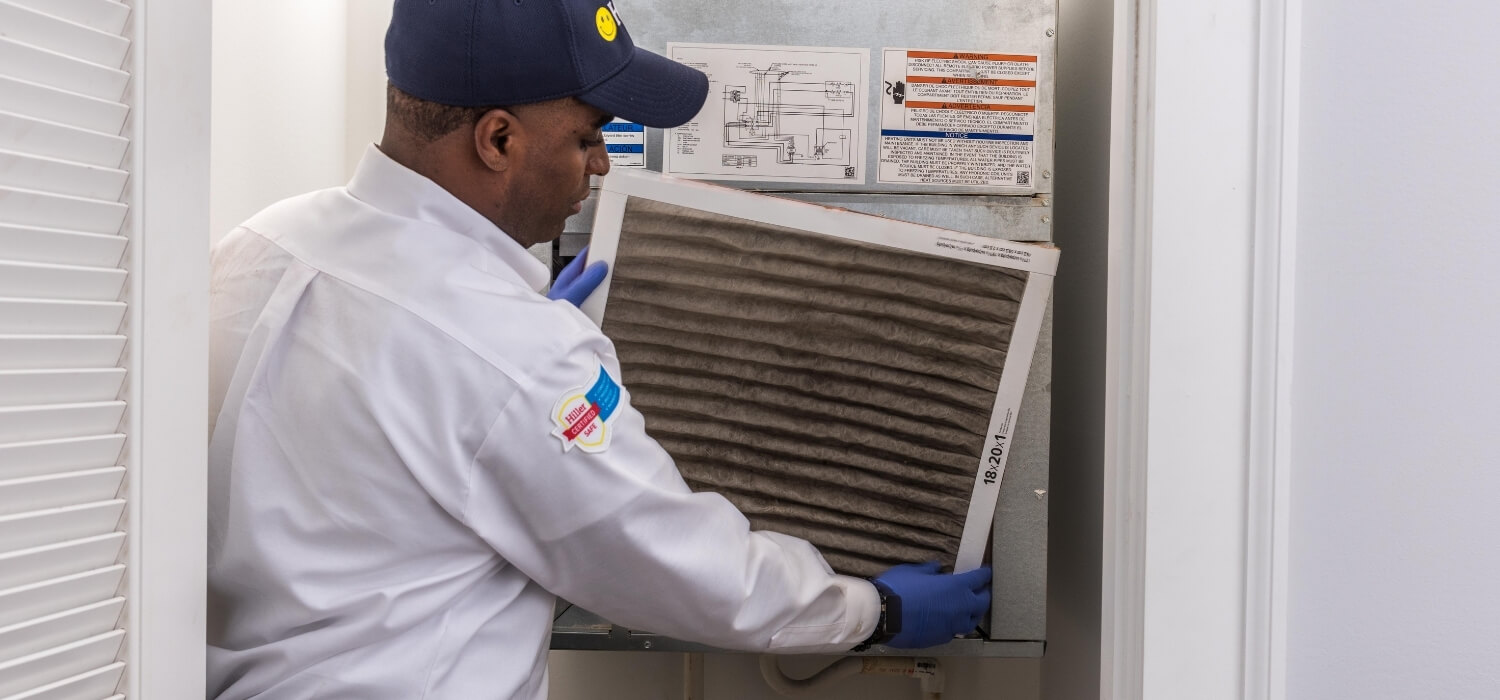
In addition to annual maintenance, consider tacking on an HVAC cleaning. A professional HVAC cleaning and filtration include:
- Particle removal
- Germ killer
- Chemical gas/fume removal
Improving your air quality helps everyone breathe a bit easier and reduces allergy symptoms.
Improving Your Home’s Energy Efficiency
Improving your home’s energy efficiency starts with an HVAC replacement. A new HVAC system can save you hundreds in yearly energy expenses and help you breathe easier! If you have started searching for an “HVAC repair near me,” ask about whether it is time to make the switch to a new unit.
Now is the time to start as the upcoming months can place added strain on your air conditioner. Contact us today!
 Daily Promotion
Daily Promotion
FREE 10-Year Extended Warranty with Generac
Bonus protection for your backup power.
Get Promotion